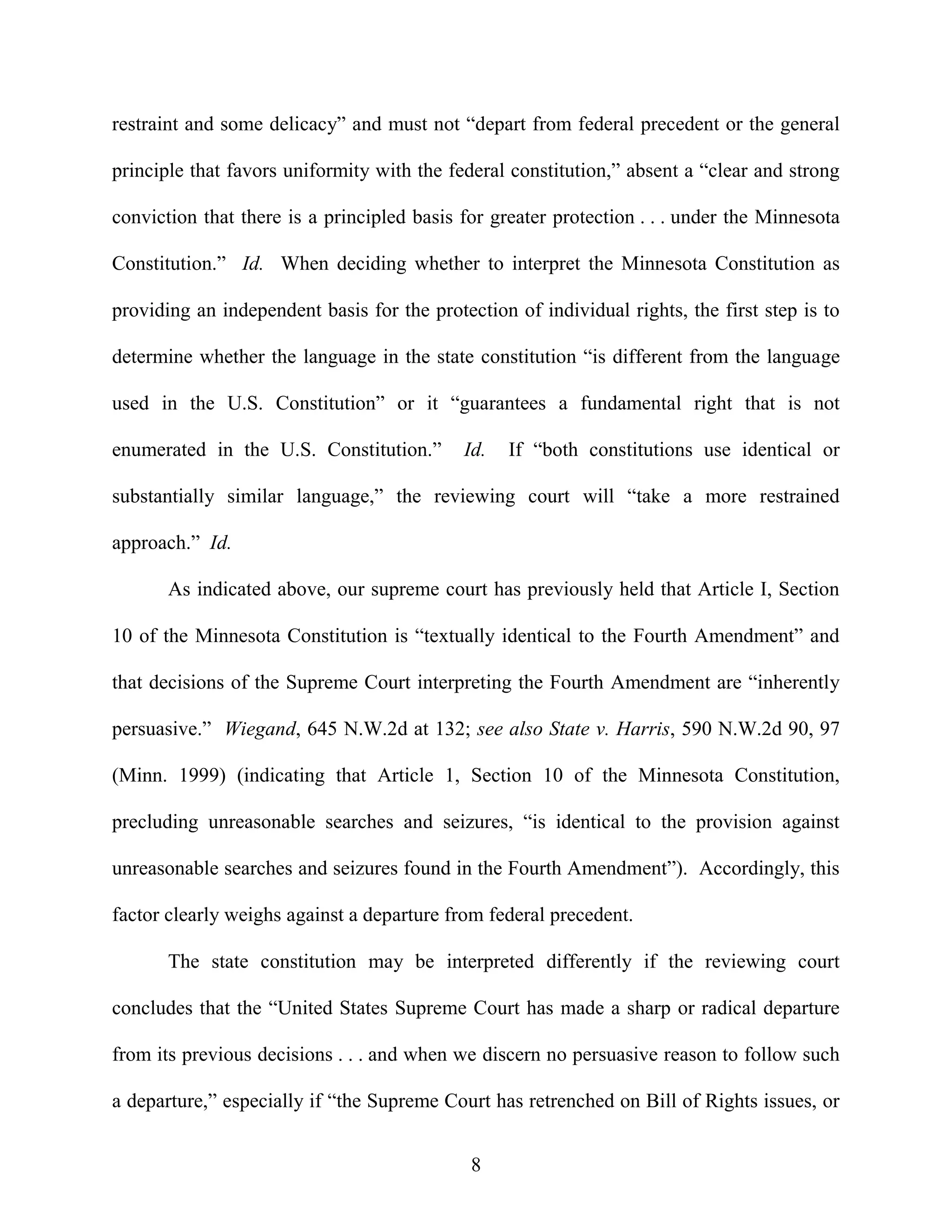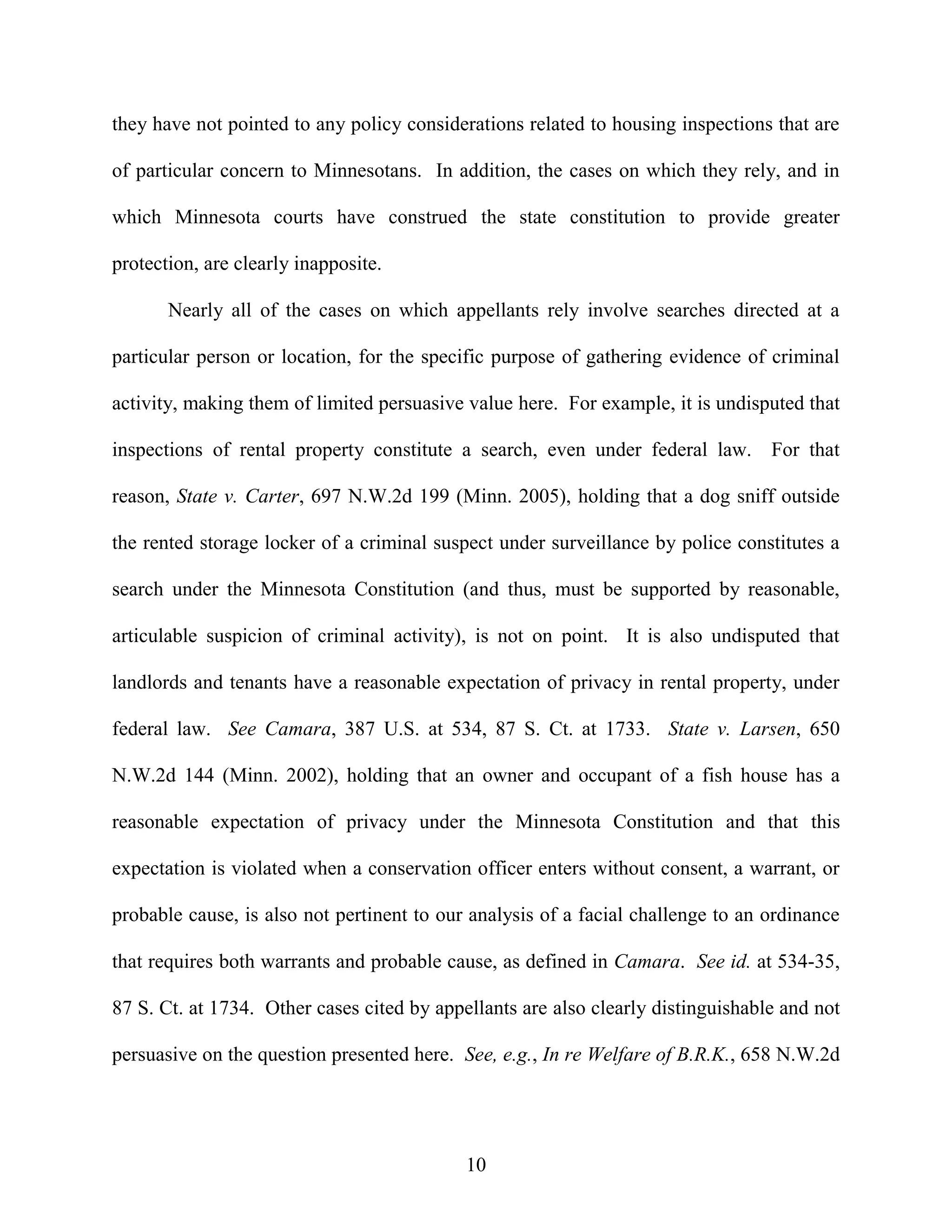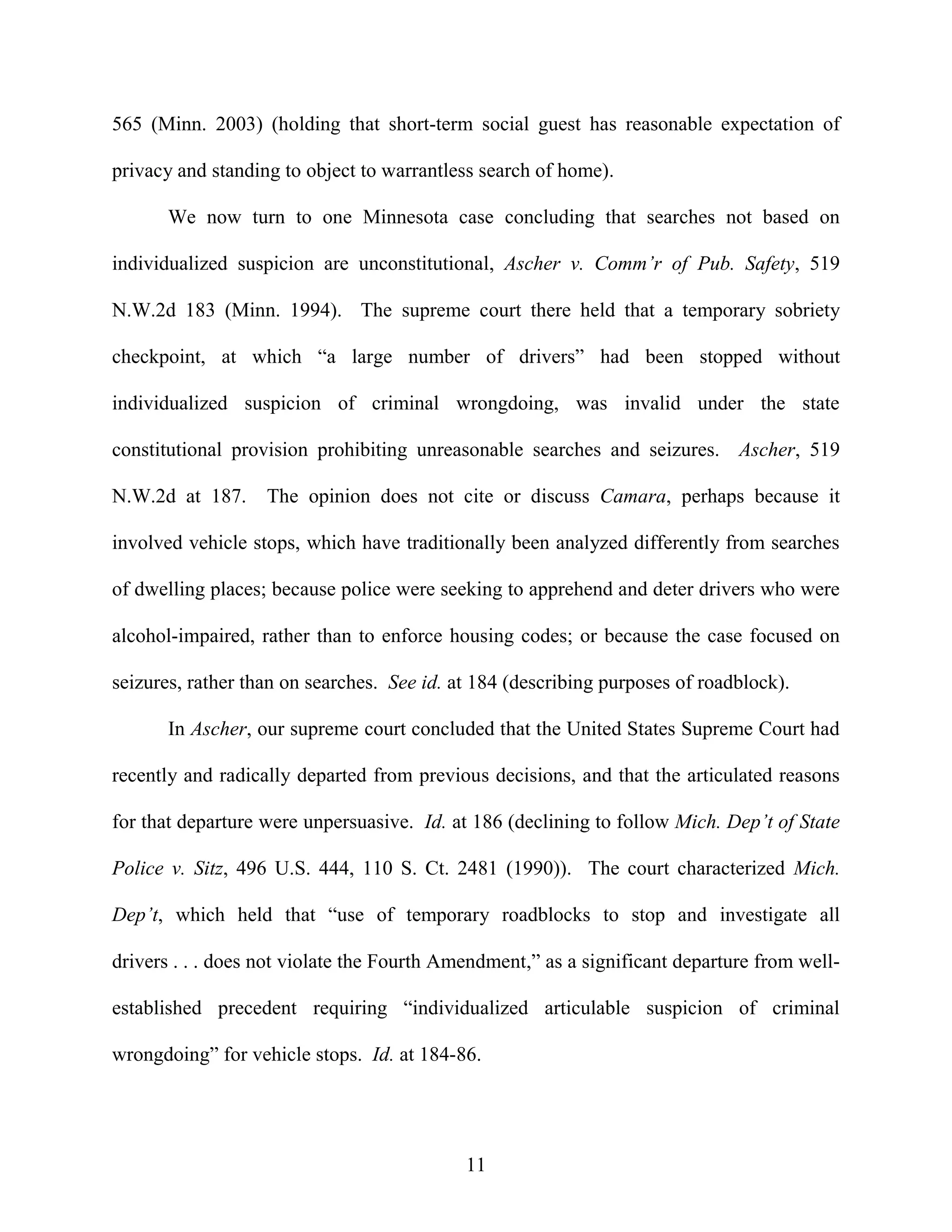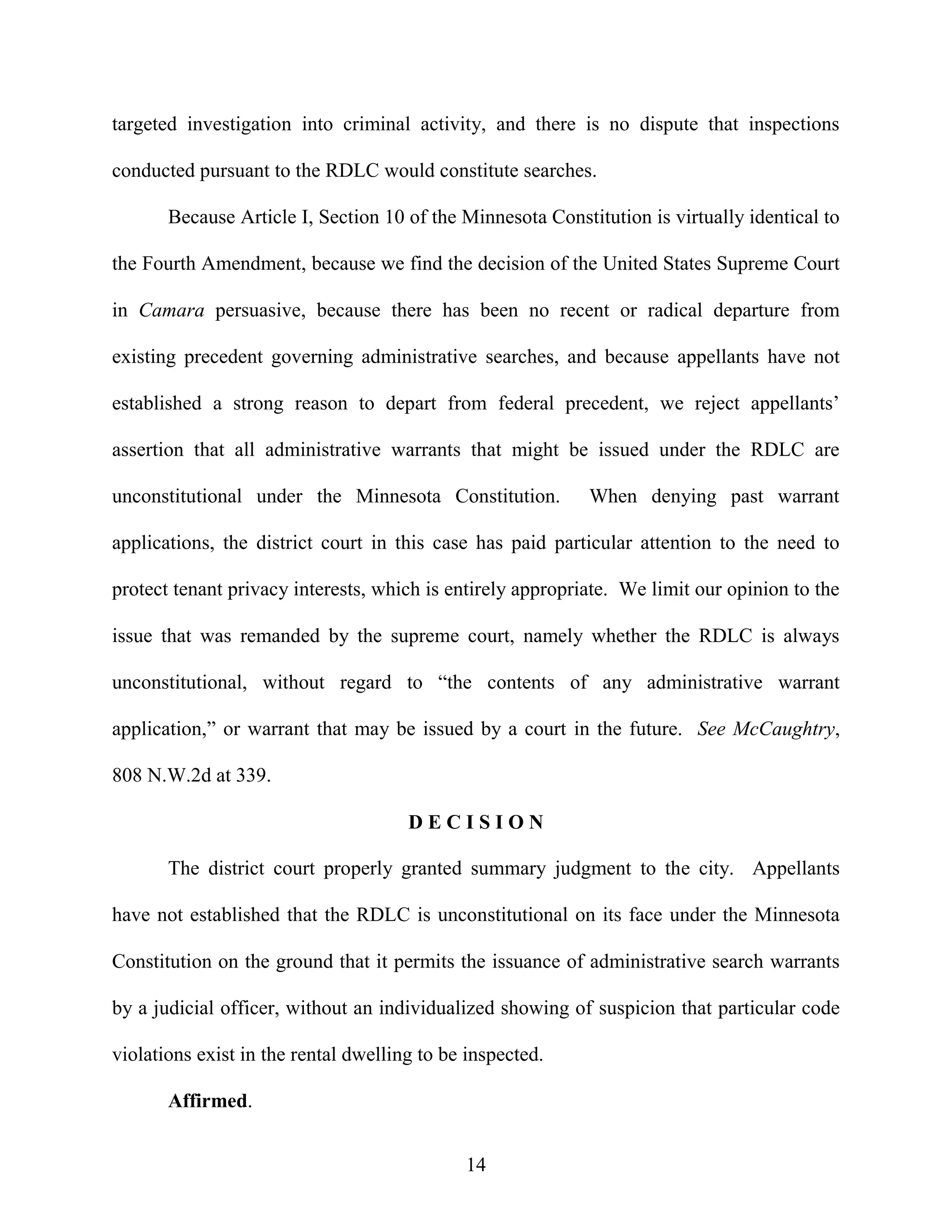The document is a court opinion from the Minnesota Court of Appeals regarding a challenge to a municipal ordinance in Red Wing, Minnesota that allows for warrantless inspections of rental properties to check for code violations. The court affirms the lower court's decision granting summary judgment for the city. The court finds that the U.S. Supreme Court's decision in Camara v. Municipal Court established that reasonable inspections of rental properties pursuant to warrants do not require individualized probable cause of a code violation and do not violate the Fourth Amendment. The court also determines that the Minnesota Constitution should be interpreted consistently with the Fourth Amendment in this context, and that the plaintiffs have not provided sufficient justification to interpret the Minnesota Constitution differently. Therefore, the rental


![standing to seek a declaratory judgment. McCaughtry v. City of Red Wing, No. A10-332
(Minn. App. Sept. 28, 2010). The supreme court reversed, concluding that appellants’
facial challenge under the Minnesota Constitution to the ordinance allowing inspections
based on administrative warrants presents a justiciable controversy. McCaughtry v. City
of Red Wing, 808 N.W.2d 331, 339 (Minn. 2011). The supreme court remanded for this
court “to consider the merits of appellants’ challenge to the Red Wing rental inspection
ordinance under the Minnesota Constitution.” Id. at 341. We requested supplemental
briefing from the parties and now affirm the summary judgment on other grounds.
FACTS
The facts are not in dispute. As the district court indicated, “[t]he record makes it
clear that much of the rental housing in Red Wing is aging, that some of the properties
have never been inspected internally, and that an external inspection is insufficient to
determine internal conditions.” A study commissioned by the city found significant
problems with rental housing, including lack of maintenance and violations of building
and safety codes. See McCaughtry, 808 N.W.2d at 333. The study recommended
adoption of a rental inspection program. Id. An ordinance providing for the inspection
of “rental dwellings” was initially adopted in 2005 and later amended; the version
addressed in the district court and by the parties was codified as Red Wing, Minn., City
Code § 4.31 (2008), entitled the Rental Dwelling Licensing Code (RDLC).1
1
The ordinance has been renumbered, and is now found at Red Wing, Minn., City Code
§ 4.04 (2011). For the convenience of those more likely to have access to the current
version of the RDLC, we will refer to the current version throughout this opinion, as the
supreme court did in its decision. See McCaughtry, 808 N.W.2d at 333-34.
3](https://image.slidesharecdn.com/opa100332-061112-120612164010-phpapp01/75/Robert-McCaughtry-et-al-vs-City-of-Red-Wing-3-2048.jpg)

![appellants argue unequivocally that “no administrative warrants are permitted under the
Minnesota Constitution.” They urge us to construe the language of the Minnesota
Constitution in a manner dramatically different from the Supreme Court’s interpretation
of the nearly identical Fourth Amendment of the United States Constitution and to adopt
arguments specifically rejected by the Supreme Court 45 years ago. The propriety of
doing so is the sole issue before us on remand.
ISSUE
Should Article 1, Section 10, of the Minnesota Constitution be interpreted to
require individualized probable cause of a code violation in a particular building, as a
prerequisite to the issuance of an administrative search warrant, even though that position
was rejected by the United States Supreme Court when it interpreted the Fourth
Amendment of the United States Constitution 45 years ago?
ANALYSIS
“[A]ppellants are presenting a facial challenge to the constitutionality of the
ordinance.” McCaughtry, 808 N.W.2d at 339. That challenge “does not depend on the
contents of any administrative warrant application because a facial challenge asserts that
a law always operates unconstitutionally” and it “presents a purely legal question that
does not require the development of a factual record.” Id. (quotation omitted). A
constitutional challenge involves a question of law subject to de novo review, and the
reviewing court is not bound by the district court’s decision. Hamilton v. Comm’r of
Pub. Safety, 600 N.W.2d 720, 722 (Minn. 1999). But “local ordinances are presumed
valid and will not be declared unconstitutional unless clearly shown to be so.” Arcadia
Dev. Corp. v. City of Bloomington, 552 N.W.2d 281, 285 (Minn. App. 1996), review
denied (Minn. Oct. 29, 1996).
5](https://image.slidesharecdn.com/opa100332-061112-120612164010-phpapp01/75/Robert-McCaughtry-et-al-vs-City-of-Red-Wing-5-2048.jpg)
![The Minnesota Supreme Court has held that Article I, Section 10 of the Minnesota
Constitution is “textually identical to the Fourth Amendment”2 and decisions of the
United States Supreme Court interpreting the Fourth Amendment are “inherently
persuasive.” State v. Wiegand, 645 N.W.2d 125, 132 (Minn. 2002). Interpreting the
Minnesota Constitution differently may be justified if recent decisions by the United
States Supreme Court constitute “a sharp departure from previous decisions” or “a radical
departure from precedent.” Id.
In 1967, the Supreme Court held that a nonconsensual and warrantless search of a
residence by a municipal housing inspector violates the Fourth Amendment. Camara,
387 U.S. at 534, 87 S. Ct. at 1733. But that holding was “the beginning, not the end, of
[the Court’s] inquiry.” Id. The Court recognized the nearly “unanimous agreement
among those most familiar with this field that the only effective way to seek universal
compliance with the minimum standards required by municipal codes is through routine
periodic inspections of all structures.” Id. at 535-36, 87 S. Ct. at 1734. No matter how
substantial the public interest in protecting health and safety, that is not determinative,
because citizens also have “a very tangible interest in limiting the circumstances under
which the sanctity of [the] home may be broken by official authority.” Id. at 531-33, 87
S. Ct. at 1732-33.
In Camara, the Court held that housing inspections should not be conducted
without a warrant issued after a showing of reasonableness and a balancing by the
2
There are minor variations in punctuation, and the state constitutional provision
includes one use of the plural for “person,” but we defer to the supreme court’s
determination that the provisions are substantially identical.
6](https://image.slidesharecdn.com/opa100332-061112-120612164010-phpapp01/75/Robert-McCaughtry-et-al-vs-City-of-Red-Wing-6-2048.jpg)
![decision-maker of “the need to search against the invasion which the search entails.” Id.
at 536-37, 87 S. Ct. at 1735. “[P]robable cause to issue a warrant to inspect” may be
established by the existence of “reasonable legislative or administrative standards for
conducting” inspections in a particular area, which standards “may be based upon the
passage of time, the nature of the building . . ., or the condition of the entire area.” Id. at
538, 87 S. Ct. at 1736 (quotation omitted). But the required standards “will not
necessarily depend upon specific knowledge of the condition of the particular dwelling.”
Id. The Court specifically rejected the complaining tenant’s argument that “warrants
should issue only when the inspector possesses probable cause to believe that a particular
dwelling contains violations of the minimum standards prescribed by the code being
enforced.” Id. at 534, 87 S. Ct. at 1734. In short, the arguments being made by
appellants before this court are identical to those rejected in Camara. And this court has
previously recognized Camara as controlling authority, when concluding that
administrative warrants for housing inspections were properly issued and enforceable by
civil contempt. In re Search Warrant of Columbia Heights v. Rozman, 586 N.W.2d 273,
275-76 (Minn. App. 1998), review denied (Minn. Jan. 21, 1999).
Appellants argue that we should disregard the holding in Camara and interpret the
Minnesota Constitution to preclude the issuance of administrative warrants. The
decisions of our supreme court have “established a definite baseline for how [to]
approach the task of interpreting a provision of the Minnesota Constitution, especially
when there is an identical or substantially similar federal counterpart.” Kahn v. Griffin,
701 N.W.2d 815, 828 (Minn. 2005). An appellate court should “approach this task with
7](https://image.slidesharecdn.com/opa100332-061112-120612164010-phpapp01/75/Robert-McCaughtry-et-al-vs-City-of-Red-Wing-7-2048.jpg)





![Just as our supreme court in Ascher was concerned about the unfettered discretion
of law enforcement officers conducting the sobriety checkpoint, the United States
Supreme Court in Camara identified the risk that individuals would be subject “to the
discretion of the official in the field” as one of the sources of the constitutional violation
that results from warrantless searches. See Camara, 387 U.S. at 532, 87 S. Ct. at 1733;
Ascher 519 N.W.2d at 184. The RDLC that is being challenged by appellants here
clearly limits the discretion of housing inspectors in the field. The court in Ascher was
understandably concerned that law-abiding citizens would be swept up in the pursuit of
drunk drivers through use of the checkpoint, and held that was impermissible in light of
“the state’s failure to meet its burden in articulating a persuasive reason for dispensing
with the individualized suspicion requirement.” Ascher, 518 N.W.2d at 187. But the
Camara court specifically addressed the interests of “law-abiding citizen[s]” to be
protected from “the possibility of criminal entry under the guise of official sanction.”
Camara, 387 U.S. at 530-31, 87 S. Ct. at 1732. And there is an additional reason to
require individualized suspicion before making a valid warrantless stop of a vehicle in
drunk-driving cases: drunk-driving behavior is more readily discernible from the driver’s
conduct on a roadway in public, unlike a code violation.
Finally, we reject appellants’ assertion that a recent Supreme Court decision
characterizing the use of a GPS device on a criminal suspect’s vehicle as a search under
the Fourth Amendment compels us to ignore Camara. See United States v. Jones, 132
S. Ct. 945 (2012). Jones did not cite Camara, the police in Jones were conducting a
13](https://image.slidesharecdn.com/opa100332-061112-120612164010-phpapp01/75/Robert-McCaughtry-et-al-vs-City-of-Red-Wing-13-2048.jpg)
